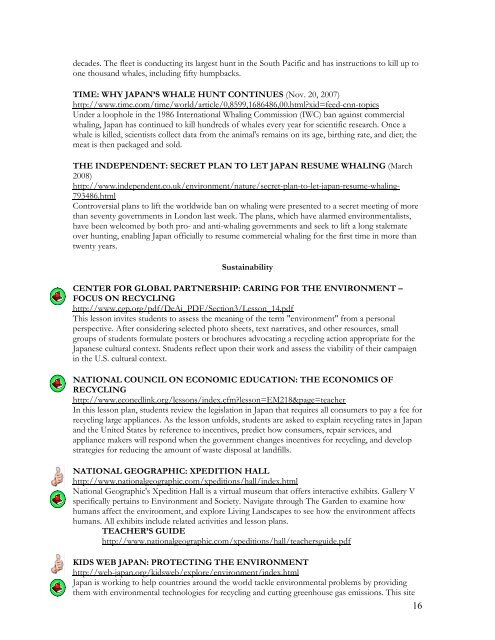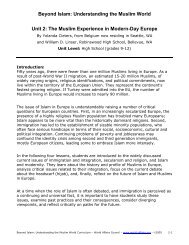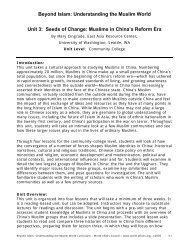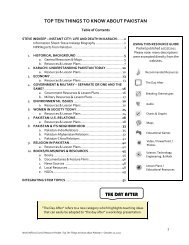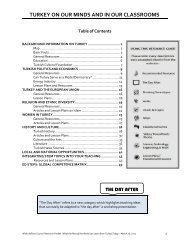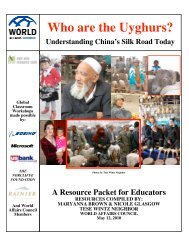The Japanese Approach to Environmental Issues - World Affairs ...
The Japanese Approach to Environmental Issues - World Affairs ...
The Japanese Approach to Environmental Issues - World Affairs ...
You also want an ePaper? Increase the reach of your titles
YUMPU automatically turns print PDFs into web optimized ePapers that Google loves.
decades. <strong>The</strong> fleet is conducting its largest hunt in the South Pacific and has instructions <strong>to</strong> kill up <strong>to</strong>one thousand whales, including fifty humpbacks.TIME: WHY JAPAN’S WHALE HUNT CONTINUES (Nov. 20, 2007)http://www.time.com/time/world/article/0,8599,1686486,00.html?xid=feed-cnn-<strong>to</strong>picsUnder a loophole in the 1986 International Whaling Commission (IWC) ban against commercialwhaling, Japan has continued <strong>to</strong> kill hundreds of whales every year for scientific research. Once awhale is killed, scientists collect data from the animal's remains on its age, birthing rate, and diet; themeat is then packaged and sold.THE INDEPENDENT: SECRET PLAN TO LET JAPAN RESUME WHALING (March2008)http://www.independent.co.uk/environment/nature/secret-plan-<strong>to</strong>-let-japan-resume-whaling-793486.htmlControversial plans <strong>to</strong> lift the worldwide ban on whaling were presented <strong>to</strong> a secret meeting of morethan seventy governments in London last week. <strong>The</strong> plans, which have alarmed environmentalists,have been welcomed by both pro- and anti-whaling governments and seek <strong>to</strong> lift a long stalemateover hunting, enabling Japan officially <strong>to</strong> resume commercial whaling for the first time in more thantwenty years.SustainabilityCENTER FOR GLOBAL PARTNERSHIP: CARING FOR THE ENVIRONMENT –FOCUS ON RECYCLINGhttp://www.cgp.org/pdf/DeAi_PDF/Section3/Lesson_14.pdfThis lesson invites students <strong>to</strong> assess the meaning of the term "environment" from a personalperspective. After considering selected pho<strong>to</strong> sheets, text narratives, and other resources, smallgroups of students formulate posters or brochures advocating a recycling action appropriate for the<strong>Japanese</strong> cultural context. Students reflect upon their work and assess the viability of their campaignin the U.S. cultural context.NATIONAL COUNCIL ON ECONOMIC EDUCATION: THE ECONOMICS OFRECYCLINGhttp://www.econedlink.org/lessons/index.cfm?lesson=EM218&page=teacherIn this lesson plan, students review the legislation in Japan that requires all consumers <strong>to</strong> pay a fee forrecycling large appliances. As the lesson unfolds, students are asked <strong>to</strong> explain recycling rates in Japanand the United States by reference <strong>to</strong> incentives, predict how consumers, repair services, andappliance makers will respond when the government changes incentives for recycling, and developstrategies for reducing the amount of waste disposal at landfills.NATIONAL GEOGRAPHIC: XPEDITION HALLhttp://www.nationalgeographic.com/xpeditions/hall/index.htmlNational Geographic's Xpedition Hall is a virtual museum that offers interactive exhibits. Gallery Vspecifically pertains <strong>to</strong> Environment and Society. Navigate through <strong>The</strong> Garden <strong>to</strong> examine howhumans affect the environment, and explore Living Landscapes <strong>to</strong> see how the environment affectshumans. All exhibits include related activities and lesson plans.TEACHER’S GUIDEhttp://www.nationalgeographic.com/xpeditions/hall/teachersguide.pdfKIDS WEB JAPAN: PROTECTING THE ENVIRONMENThttp://web-japan.org/kidsweb/explore/environment/index.htmlJapan is working <strong>to</strong> help countries around the world tackle environmental problems by providingthem with environmental technologies for recycling and cutting greenhouse gas emissions. This site16


